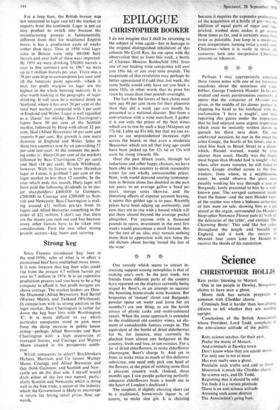EPILOGUE
CHRISTOPHER BOOKER
I do not imagine that I shall be returning to the subject of wine again—but in homage to the original distinguished inhabitant of this column Mr Cyril Ray, let me open with the observation that as from this week, a bottle of Chateau Mouton Rothschild 1961 from one of our leading wine companies will cost you 186s 6d, or just over nine pounds. The magnitude of this revelation may perhaps be better appreciated if I add that, last week, the same bottle would only have set you back a mere 102s; in other words that its price has risen by more than four pounds overnight.
The fact that the lovers of best claret must now pay 80 per cent more for their pleasures than they did a week ago can hardly be presented as a national disaster. But from a conversation with a wine merchant, I gather it is not only the prices of the best wines which are to rise by such a leap (Margaux up 77s 6d, Lafite up 81s 6d), but that we can ex- pect to see unprecedented increases right across the board, so that even a moderate Beaujolais which not all that long ago could have been picked up for 12s 6d or 15s will soon be rising towards 30s.
Over the past fifteen years, through tax reductions and other happy chances, we have been able in this country to drink reasonable wines for not wholly unreasonable prices. Now, with world demand soaring (consump- tion in Britain alone has doubled in the past ten years, to an average gallon a head per year), storage costs likewise, and the distorting effects of expense account buying, it seems this golden age is to pass. Recently prices have been edging up ominously, and now they are to rise with a bound which will put them almost beyond the average pocket altogether. For anyone with a thousand pounds to spare, investment in the next few weeks would guaranteee a small fortune. But for the rest of us, alas, may remain nothing more than to appreciate with new force the old dictum about having 'tasted the last of the wine'.
* * *
One remedy which seems to attract in- creasing support among oenophiles is that of making one's own. In the past week, two friends from different parts of the country have reported on the displays currently being staged by Boot's, in an attempt to succour the booming home-made wine business. But briquettes of 'instant' claret and Burgundy powder (pour on water and leave for six months?) are one thing, as are the lavish arrays of plastic casks and multi-coloured yeasts. When the same approach is extended to the traditional old country wines, an ele- ment of considerable fantasy creeps in. The equivalent of the bottle of dried elderberries for 9s, for instance, may currently be plucked from almost any hedgerow in the country, fresh and free, in ten minutes. For a jar of dried elderflowers, to make elderflower champagne, Boot's charge 3s. And yet in June, to make twice as much of this delicious substance, one need only pick one head of the flowers, at the price of nothing more than a pleasant country walk. (Indeed, three months ago, I saw people gathering perfectly adequate elderflowers from a bomb site in the heart of London's dockland.) The simplest, if slightly cheating short cut to a traditional, home-made liquor is, of course, to make sloe gin. It is cheating
because it requires the expensive preliminary of the acquisition of a bottle of gin—but the addition of equal parts of sugar and ripe, pricked, washed sloes makes it go almost three times as far, and is certainly more than twice as palatable. Just keep in a moderate, even temperature, turning twice a week until Christmas—when it is ready to strain off, consume, turn into inexpensive Christmas presents or whatever.
* * *
Perhaps I may appropriately conclude these vinous notes with one of my favourite anecdotes about the notorious old wine- bibber, George Frederick Handel. In his less exalted and more parsimonious moments, it seems that the composer of Messiah was given, in the middle of his dinner parties. to clapping his hand to his forehead with the exclamation 'I have a tought', and then repairing (his guests under the impression that he had enjoyed some urgent inspiration which must be instantly written down) to quench his thirst next door. On one celebrated occasion, he met in the street the artist Goupy, the Scarfe of his times, and in- vited him back to Brook Street to a dinner which, Handel warned, would be even sparser than usual. Hardly was the frugal meal begun than Handel had 'a tought'—but when, after many minutes, he still failed to return, Goupy strolled across to the bow window, from where, in a neighbouring room, he could observe the great man steadily working his way through a case of Burgundy, lately presented to him by a well- known peer. The enraged cartoonist strode from the house—and the next Handel knew of the matter was when a hideous caricature of him went on sale, showing him as a pig seated at the organ, surrounded (as Handers biographer Newman Flower puts it) 'with all the delicacies of the table', and entitled 'The Charming Brute'. This sold like hot cakes throughout the length and breadth of England, and it took the success of Messiah four years later for Handel to recover the shreds of his reputation.


































 Previous page
Previous page